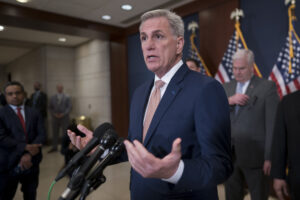Sexual Abuse in Sport: It Isn’t New, Part 1
The problem has long been rife in the world of high-performance sports but is often covered up so corporations can profit. Gregory Bull / AP
Gregory Bull / AP
Gymnasts riveted the world’s attention in January, as athlete after athlete told of nightmare ordeals they experienced at the hands of USA Gymnastics and Michigan State University doctor Larry Nassar. For decades, he had impunity—protected, his victims say, by MSU and USA Gymnastics. Nassar abused the girls in the guise of medical treatment, behind his carefully calculated dividers, sheets and towels, often in the presence of their parents.
Some may think these young women and girls will now “move on,” as we say to victims in an era of incomprehensible actions. Soon, the sports world, if it mentions this crisis, will use the word “closure.” The women have become lawyers, are studying to be doctors, coaches—people who will help protect the next generation of girls. They have partners they love and are loved by in return. Their families surround them. They are heroic. But like all sexual abuse survivors, the memory of their predator remains in their minds and their bodies.
Nassar is now incarcerated for the remainder of his life, but what of the army of USA Gymnastics and MSU officials and administrators who delivered a steady supply of victims? How is it possible for more than 250 females to be sexually abused without detection—even when they reported him to the authorities over the span of several years?
At 17, Olga Korbut of the Soviet Union won multiple medals at the 1972 Munich Olympics. She transformed gymnastics from a graceful, dancelike performance to a spectacular, gravity-defying exhibition of flips and twists. Twenty years later, Korbut alleged that a coach had sexually, physically and psychologically abused her. Other teammates were raped, she said, and all were injured and starved. In 2017, at age 61 and living in poverty, she sold off her Olympic medals.
At the 1976 Montreal Olympics, Romania’s Nadia Comăneci replaced Korbut as the pixie who brought the crowd to their feet. While she has never alleged sexual abuse, her coach from that era, Béla Károlyi, and his wife, Martha, ran the training facility in Texas where American gymnasts say they were isolated, starved and held hostage to Nassar’s abuse. As of Jan. 30, the Karolyi Ranch is under criminal investigation.
In 2012, the 5th International Olympic Committee Congress on Women in Sport was held in Los Angeles. As a former athlete, I joined with American women to lobby for the inclusion of women’s canoeing at the Olympics. There is only one chance every four years at the congress to tell the IOC what needs to change, but 69-year-old world champion distance swimmer Diana Nyad spoke with such eloquence and emotion as a panelist that she eclipsed everything else.
“I was not just a good swimmer, I could do anything,” Nyad told the delegates. “Swimming was my raison d’etre to feel good about myself. I was going to win a gold medal for America. In Mexico City at the 1968 [Olympics] I would stand on the gold medal platform. … I hadn’t lost a 100- or 200-meter race for a couple of years.”
Nyad, too, says she experienced sexual abuse at the hands of a trusted trainer. It was 1963; Nyad was 14 and lived in Florida. She easily qualified for the semifinals in the 100 meters on the first day. She went to her coach’s house to nap before the final. “We were always at coach’s house—baby-sat his kids, watched sports on TV, played football on the beach.” Nyad drew her breath in. “It’s shocking, still, all these years later … unforgettable, violent, two, three, maybe four minutes, I don’t know. I was raped at the hands of my beloved coach.
“My coach,” Nyad repeated quietly. “There are too many of you out there who know this story.”
The coach was let go by her club (Nyad did not specify why) and snapped up “by the university down the road. Fourteen years later he was fired for sexual abuse there too,” Nyad said.
Girls and women who find their passion in sport—testing the strength, endurance and balance of their bodies and spirits as they fly through time and space—enter a minefield. They step into a deeply protected and secretive patriarchy where militaristic practices and punishment flourish, where training through injury is a merit badge, where silence and obedience are rewarded and speaking up is considered evidence of not being a “team player”—an excellent way of destroying one’s chances of going to the Olympics and crushing one’s passion.
Varda Burstyn made this argument about all high-performance sports in her book, “The Rites of Men: Manhood, Politics and the Culture of Sport,” in 1999. When we spoke recently, she said, “The promotion of ‘hypermasculinity,’ the core value system in sport, the carrier of class and coercive values, and the driver of for-profit spectacle, has led to authoritarian and sacrificial training regimes in which coaches are invested with far too much power and a ruthless level of command.” In turn, she argues, “coaches instrumentalize athletes to these goals. Selecting for coaches who thrive in this system will often select for abusive people. And sexual abuse often comes with the package.”
The last person to benefit is the athlete.
“With the vast commercialization of the Olympics,” Burstyn added, “athletes have become the vehicles for profit and nationalistic prestige, training at ever younger ages. This means they are utterly lacking in power. Yet the enterprise is marketed as ‘healthy’ and ‘character building.’ Parents often end up believing that this form of high-performance sport is the best thing their kid can do.”
The “Olympic family” has gathered in Pyeongchang this month. The IOC, sponsors, partners and officials will profess to fulfill the first “mission” of the Olympic Charter, which is “to encourage and support the promotion of ethics and good governance in sport as well as education of youth through sport and to dedicate its efforts to ensuring that, in sport, the spirit of fair play prevails and violence is banned.”
In May 2014, NBC Universal bought the American broadcast rights to the Olympics through to 2032—a deal the IOC says is worth $7.65 billion. That’s just one broadcaster’s deal, out of dozens made with the Switzerland-based organization that is legally defined as “a not-for-profit sports organization made up of volunteers.”
Athletes, meanwhile, shoulder the physical and emotional risks as disposable commodities. Should they incur career-ending injuries, or fail to be “a team player” because they question authority, they are replaced by another athlete with the same dreams, talent and work ethic who will shut up and put out. Families take huge financial risks, remortgage property, take bank loans, relocate or send their child away after being convinced that only certain coaches can produce winners.
Many argue that the Olympic family is an incestuous one. American swimmers have reported legions of coaches for sexual abuse even longer than gymnasts have. Those coaches, too, were quietly protected by officials. In the past two months, two high-ranking Canadian gymnastics coaches, Dave Brubaker and Scott McFarlane, have been charged with sexual assault, while police investigate a third. In December 2017, Canada’s 2015 Junior World Swimming Championship coach was convicted of sexual exploitation, while another Ontario swim coach faces new charges. Other sports and countries are no better.
Female athletes in every sport report body-image problems and heightened levels of eating disorders. Starving girls as their bodies try to emerge into womanhood without sufficient hormones or fat to do so robs these girls of an inherent right to discover and own their sexuality, and at the same time slowly kills them—an intrinsic form of sexual abuse. But disenfranchising athletes from their bodies is the norm for sports that sell winning and “perfect” bodies as products.
Meanwhile, organizations like USA Gymnastics and USA Swimming partner with powerful corporations and sell an apple pie version of trafficking children and young adults. In recent months, however, AT&T, Procter & Gamble, Under Armour, and Hershey have withdrawn their sponsorship of USA Gymnastics. The group’s 2015 financial statement shows assets of nearly $29 million, with revenues of $23,703,755. It is listed as a not-for-profit organization. The National Gymnastics Foundation, which filed separately, showed assets of $15,610,975.
Between 2012 and now, 128 coaches, volunteers or officials have made USA Gymnastics’ permanently ineligible list because they have contravened the organization’s code of ethics, been convicted of a crime and/or violated its bylaws.
National team members must sign a multipage contract that gives USA Gymnastics “the non-exclusive right to use, license, assign, sell or otherwise use my name, image, likeness, voice or performance as a member of the Team.” Athletes can negotiate whether they receive a portion of the revenues.
The contract also includes “medical attention” and “inability to compete” clauses. Team members had to consent to USA Gymnastics’ “medical staff of its choice, customary medical care and athletic training … as warranted in the course of … participation as a member of the Team.” If athletes decided to retire or did not have the ability to compete, they had to “agree to submit to all reasonable requests for examination or evaluation by medical personnel.”
USA Swimming’s 2016 financial statement showed total assets of $52,755,594, with total revenues of $39,620,614. This includes its foundation and own insurance company. NBC Universal is the “broadcast partner” for swimming and gymnastics. USA Swimming’s sponsors include Omega, BMW and Marriott.
Diana Nyad was not alone with her survivor story at the IOC Women’s Congress five years ago. For the entire three days of the congress, woman after woman spoke about sexual abuse—no matter the sport, no matter the country. The unleashing of female anger and power caught the IOC by surprise. At the end of the conference, five male IOC members took center stage. They said they had been taking notes throughout the congress. “We’re going to tell you what you’ve said,” they declared, as if the more than 300 women there needed reminding.
But despite the days of testimony from female athletes, sexual abuse wasn’t even a remote tangent on the official Olympic myth they spun.
Your support matters…Independent journalism is under threat and overshadowed by heavily funded mainstream media.
You can help level the playing field. Become a member.
Your tax-deductible contribution keeps us digging beneath the headlines to give you thought-provoking, investigative reporting and analysis that unearths what's really happening- without compromise.
Give today to support our courageous, independent journalists.






You need to be a supporter to comment.
There are currently no responses to this article.
Be the first to respond.